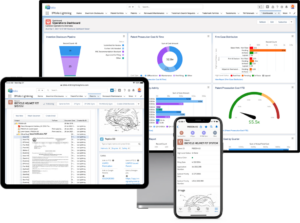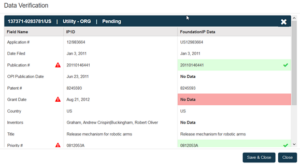When choosing an IP management software, there are many options available. Understanding how to evaluate and select the right software can be overwhelming. Continue reading to find out 10 tips for selecting an IP management software provider.
IP management software (IPMS) has come a long way in recent years. As technology has evolved, many businesses and law firms find that their antiquated system no longer meets their needs. While there are many options available in the marketplace, all IPMS providers are not created equal. Choosing the right one can seem like a complex task—one filled with advantages as well as potential pitfalls. You need to select a provider that can help improve your processes today while scaling easily to meet the needs of tomorrow.
If you are in the process of selecting an IP management software provider, this blog will help.
Here’s what to look for when selecting an IP management software provider:
- Reputation and strength
- Integration flexibility
- Security and performance
- Country law and forms coverage
- Task and workflow management
- Searching and reporting
- Secure Collaboration
- Prior art/IDS management
- IP data roadmap
- Implementation, training and support
1. Reputation and strength
It’s important to assess the strength and health of a prospective provider. Look for a provider with a growing base of customers who are active users. Read what customers are saying about the provider and its solutions and services through online review sites like G2 or Salesforce Appexchange.
Also, see whether the provider is investing in developing new capabilities and whether they also provide IP data resources and additional IP services. These are all indications of a provider’s ability to meet your needs into the future.
2. Integration flexibility
Does the provider offer the ability to integrate with other best-of-breed systems? Look for an IPMS solution with open APIs that allow deep integration with other solutions. This gives you the flexibility to take full advantage of modern IPMS technology while maintaining your existing systems and processes for specific functions.
3. Security and performance
Cyberattacks, ransomware and corporate espionage are on the rise. It is more important than ever to make sure an IPMS provider is taking appropriate steps to protect your data and ensure optimal performance.
Make sure they have a dedicated Dev-Ops team monitoring the application, a dedicated security team and a flexible security model that includes robust authentication protections. It is wise to ask about any third parties that providers partner with to ensure they are trusted companies with solid track records. These are critical factors for assessing a provider’s ability to meet your performance expectations while effectively managing risk.
4. Country law and forms coverage
With global IP law constantly changing, it is critical that your IPMS contain accurate, up-to-date country law definitions. Similarly, a well-managed Patent and Trademark Office (PTO) forms library is critical to avoid time-consuming copying and pasting data. It’s important to understand how often the provider updates country and forms, whether these processes are automated, whether they allow customized country law rules and whether PTO form generation is seamlessly integrated.
5. Task and workflow management
Streamlining and automating tasks is a key success factor for an IPMS. Make sure the IPMS solution can be tailored to meet the unique workflow requirements of your organization without extensive configuration by the provider.
Look for a solution that offers workflow “building blocks” that make it easy to customize how tasks are launched and scheduled, emails generated, fields updated, etc. based on conditional logic. The ideal solution empowers users without placing additional burdens on your IP department.
6. Searching and reporting
The ability to easily navigate through complex IP data and then quickly generate clear, actionable reports is a key success factor for an IPMS. Features like full-text keyword searching and powerful filtering across your IP portfolio save time and effort. The best solution enables users to build a wide range of reports with flexible data formats—with the ability to customize reports on-the-fly. Dashboards and visualizations that display pertinent information tailored to user needs are valuable for presenting information to decision-makers.

Dashboards and visualizations in IPfolio
7. Secure Collaboration
An IPMS should provide a platform for collaboration.
The provider should support access to the IPMS by both internal users and external partners. Permissions and security controls should be easily managed to control what external parties can view, with auditing and reporting to monitor that activity. These factors are essential to promote productive collaboration while ensuring only authorized access.
8. Prior art/IDS management
Managing prior art
and generating information disclosure statements (IDS) can be extremely time-consuming. Look for an IPMS that has a dedicated IDS management capability designed to streamline this critical task. Does it include a searchable library of patent, publication and NPL documents? Does it integrate with global patent sources? Can you easily generate a USPTO SB08 form in the correct format? These and other key features can save time and effort, especially for applications that have many citations.
9. IP data roadmap
The power of IP data is expanding. Before investing in an IPMS, it’s important to understand the provider’s IP data strategy. Make sure they have access to high-quality IP data that is updated frequently and that they leverage data to provide verification and enrichment, automation, one-click docketing, and other benefits. They should also offer private PTO integration with features that simplify retrieval of relevant data and that automate common tasks. These factors are key to unlocking the full business value of IP data.

IP data verification in FoundationIP
10. Implementation, training and support
Minimizing disruption and accelerating time to value are key success factors for IPMS adoption. Make sure the provider has a clearly defined implementation methodology. Do they have a dedicated project manager and robust Customer Support team? Does the provider take responsibility for testing? Do they provide knowledgeable, on-demand training and support with coverage that meets your needs? Ensuring the provider will be there for you long after the sale is crucial to maximize solution value, while minimizing headaches.
Choosing the right IPMS provider
Choosing an IPMS provider is an important decision that demands careful consideration and evaluation. At Clarivate™, we have made significant investments to build upon our industry-leading IP management solutions—products that more than 1,600 customers rely on every day to manage their valuable IP assets.
Why do so many IP professionals worldwide choose to partner with Clarivate? Discover the three compelling reasons.
Get in touch with us today to learn about Clarivate IP management software.





